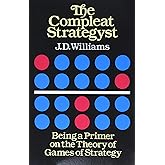
Enjoy fast, free delivery, exclusive deals, and award-winning movies & TV shows with Prime
Try Prime
and start saving today with fast, free delivery
Amazon Prime includes:
Fast, FREE Delivery is available to Prime members. To join, select "Try Amazon Prime and start saving today with Fast, FREE Delivery" below the Add to Cart button.
Amazon Prime members enjoy:- Cardmembers earn 5% Back at Amazon.com with a Prime Credit Card.
- Unlimited Free Two-Day Delivery
- Streaming of thousands of movies and TV shows with limited ads on Prime Video.
- A Kindle book to borrow for free each month - with no due dates
- Listen to over 2 million songs and hundreds of playlists
- Unlimited photo storage with anywhere access
Important: Your credit card will NOT be charged when you start your free trial or if you cancel during the trial period. If you're happy with Amazon Prime, do nothing. At the end of the free trial, your membership will automatically upgrade to a monthly membership.
Buy new:
$16.99$16.99
Ships from: Amazon.com Sold by: Amazon.com
Save with Used - Good
$9.09$9.09
Ships from: Amazon Sold by: eCampus_

Download the free Kindle app and start reading Kindle books instantly on your smartphone, tablet, or computer - no Kindle device required.
Read instantly on your browser with Kindle for Web.
Using your mobile phone camera - scan the code below and download the Kindle app.

OK
The Evolution of Cooperation: Revised Edition Paperback – December 5, 2006
Purchase options and add-ons
We assume that, in a world ruled by natural selection, selfishness pays. So why cooperate? In The Evolution of Cooperation, political scientist Robert Axelrod seeks to answer this question. In 1980, he organized the famed Computer Prisoners Dilemma Tournament, which sought to find the optimal strategy for survival in a particular game. Over and over, the simplest strategy, a cooperative program called Tit for Tat, shut out the competition. In other words, cooperation, not unfettered competition, turns out to be our best chance for survival.
A vital book for leaders and decision makers, The Evolution of Cooperation reveals how cooperative principles help us think better about everything from military strategy, to political elections, to family dynamics.
- Print length264 pages
- LanguageEnglish
- PublisherBasic Books
- Publication dateDecember 5, 2006
- Dimensions5.25 x 0.75 x 8 inches
- ISBN-100465005640
- ISBN-13978-0465005642
The Amazon Book Review
Book recommendations, author interviews, editors' picks, and more. Read it now.
Frequently bought together

Similar items that may deliver to you quickly
Editorial Reviews
Review
"When I read The Evolution of Cooperation in draft form, I scribbled all over my copy: 'Incredible!' 'Amazing!' 'Weird!' 'Fascinating!' 'Elegant!' 'Great!' I guess that tells you what I genuinely think of this book."
―Douglas Hofstadter, author of Gödel, Escher, Bach
"A fascinating introduction to the theory of cooperation, and written in a clear, informal style that makes it a joy to read."
―Times Literary Supplement
About the Author
Product details
- Publisher : Basic Books; Revised edition (December 5, 2006)
- Language : English
- Paperback : 264 pages
- ISBN-10 : 0465005640
- ISBN-13 : 978-0465005642
- Item Weight : 9.6 ounces
- Dimensions : 5.25 x 0.75 x 8 inches
- Best Sellers Rank: #240,276 in Books (See Top 100 in Books)
- #57 in Game Theory (Books)
- #666 in Decision-Making & Problem Solving
- #3,635 in Success Self-Help
- Customer Reviews:
About the authors

Discover more of the author’s books, see similar authors, read author blogs and more

Discover more of the author’s books, see similar authors, read author blogs and more
Customer reviews
Customer Reviews, including Product Star Ratings help customers to learn more about the product and decide whether it is the right product for them.
To calculate the overall star rating and percentage breakdown by star, we don’t use a simple average. Instead, our system considers things like how recent a review is and if the reviewer bought the item on Amazon. It also analyzed reviews to verify trustworthiness.
Learn more how customers reviews work on Amazon-
Top reviews
Top reviews from the United States
There was a problem filtering reviews right now. Please try again later.
Chapter 1 presents the main point of the book: "How cooperation emerges in a world of egoists without central authority". This chapter also introduces the main representation of the problem (based on the prisoners dilemma), several examples of cooperation, the main arguments for cooperation (such as the fact that the prisoner dilemma is not a zero sum game, altruism, the size of the discount factor etc) and the first proposition "if the discount factor is high, there is no best strategy".
Chapter 2 describes the computer tournament where Tit for Tat is the winner (in almost all situations). I mean the author promoted a tournament for the study of the strategies that can be used to play the iterated prisoner dilemma. Besides the main conclusions of this chapter, it is also interesting because of its historical appealing. Maybe this is one of the first important applications of computer science in Economics.
Chapter 3 is one of the most lucid introductions to evolutionary game theory. Although today we may find very good books about this topic (such as Game theory evolving - Gints, Evolutionary game theory - Weibull, Evolutionary Games and Population Dynamics - Hofbauer and Sigmund), the main ideas are presented in just few pages with almost no math (this is good for some guys). Furthermore, the author uses evolutionary game theory to analyze the stability of Tit for tat, other nice strategies and the strategy the defects in all rounds.
Chapter 4 the book presents the classical example of cooperation that arose in World war I.
Chapter 5 (previously published in American political science review) deals with the evolution of cooperation in biological systems applying the main ideas discussed in previous chapters.
Chapter 6 is about how to deal with prisoners dilemmas (in real life?!). The author provides a list of advices and justifies why Tit for Tat works. For instance, it is a "nice" strategy. I mean "Be nice". But if one is not nice with you, do not be nice either.
Chapter 7 is about how to promote cooperation. What factors in the game are necessary in order to promote cooperation. For instance, the continuous interaction between the participants is fundamental.
Chapter 8 discusses how cooperation is affected by some important issues such as the fact that people are divided in groups of similar characteristics (such as race, age etc), reputation etc.
Chapter 9 is like a summary of some ideas of the book.
That tournament was sponsored by Robert Axelrod of the University of Michigan who developed a computer environment that would different game programs against each other to determine which survival strategy was best adapted to survival.
For those believers of life, nasty, brutish and short, the findings were nothing short of astonishing: specifically that when actors were invovled in situations where they would be repeatedly interacting with each other, survival was best enhanced by cooperation.
Otherwise known as "the golden rule" of doing unto others as you would have done unto you, a computer program known as Tit for Tat outperformed all other competitors by first seeking cooperation and then narrowly mirroring the actions of its counterparts.
In other words, if Tit for Tat met a competitor it would first seek cooperation. If the competitor cooperated, Tit for Tat would thereafter cooperate. If the competitor defected, Tit for Tat would itself immediately defect but thereafter again seek cooperation by cooperating whenever the competitor thereafter chose to cooperate.
Since the publication of the original article detailing Axelrod's findings twenty five years ago, the study of cooperation or reciprocal ultruism has found applications not only in human behavior but also in genetics and evolution itself.
Inside every cell of your body are anywhere ranging to around 1000 mitochondria. If the test for different life forms are organisms which have their own DNA, mitochondria qualify. Yet, they have always been a part of human biology. And they have been there own life domain for the better part of two billion (or more) years.
Mitochondria's ability to productively work with their host cells is an example of both genetic and biological reciprocal ultruism.
Like any ground breaking work, like Newton's Principia or Darwin's Origin of Species, I was attracted to this work so I could better witness the original flash of genius. And like with Newton's Principia and Darwin's Origin of Species I was not disappointed but found many instances in which the original researchers had advanced speculations that frankly would remain fertile areas for further research. In the case of this book, I would include Axelrod's discussion of how to better take advantage of the benefits of reciprocal ultruism and also how systems can be more reciprocal ultruism friendly.
Interestingly, the places where reciprocal ultruism has tragically broken down are places that would easily be predicted by the over arching theory.
For students of genetics, biology and even behavior I can't recommend this book highly enough. In fact, in addition to this book I would also recommed the following:
Origins of Virtue by Matt Ridley which discusses the genetic aspects of reciprocal ultruism;
Prisoner's Dilemma by William Poundstone which discusses game theory as a branch of theoretical mathematics;
Selfish Gene by Richard Dawkins which is just fun; and
Oneness by Jeffrey Moses which provides verbatim quotes of the golden rule and other doxology by means of direct quotes from the world's leading religions. There's nothing like seeing material which so exactly corresponds to theoretical predictions to give you a sense of the explanatory power of the theory(ies) involved.
Through lots of error to go with my trials I learned over the years that cooperation is the best policy. With bad bosses, obstinate coworkers, rebellious kids and angry spouses. The payoffs: material, psychological, emotional, are far higher when you cooperate and can induce others to cooperate. This book, esoteric at times, explains the mathematical theory behind the why.
If you have difficulty making decisions involving a counter party, or are just interested in the dynamics at play in working or competing with others, I highly recommend this book.
Top reviews from other countries
Very encouraging to see how cooperation can form without trust. Even between selfish/egoistic players.
The evolution of cooperation offers insight both into why we cooperate and when we don't, it's implications are therefor far reaching, as it lies at the heart of evolutionary stable strategies within politics.
I hope one day this will be common knowledge, forever upending religious arguments about morality, and replacing them with a predictive view of morality, allowing us to change the dynamics of the systems we find ourselves in.













